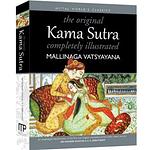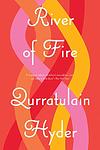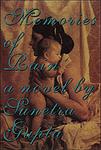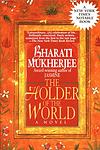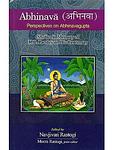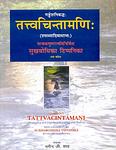The Greatest Indian Books of All Time
Click to learn how this list is calculated.
This list represents a comprehensive and trusted collection of the greatest books. Developed through a specialized algorithm, it brings together 300 'best of' book lists to form a definitive guide to the world's most acclaimed books. For those interested in how these books are chosen, additional details can be found on the rankings page.
Genres
Countries
Date Range
Reading Statistics
Click the button below to see how many of these books you've read!
Download
If you're interested in downloading this list as a CSV file for use in a spreadsheet application, you can easily do so by clicking the button below. Please note that to ensure a manageable file size and faster download, the CSV will include details for only the first 500 books.
Download-
26. Kama Sutra by Vātsyāyana
This ancient Indian text is a guide to virtuous and gracious living that discusses the nature of love, family life, and other aspects pertaining to pleasure-oriented faculties of human life. It is a comprehensive manual on the art of love and sexual behavior, providing detailed advice on courtship, marriage, and the act of lovemaking. The text, while often associated solely with sexual positions, covers a wide range of topics including the duties and privileges of a wife, advice for courtesans, and methods to attract others.
-
27. The Golden Gate by Vikram Seth
Set in the 1980s, the novel follows the life of a group of friends living in San Francisco. The protagonist, a successful yet lonely executive, is persuaded by his former girlfriend to place a personal ad, leading to a relationship with a musician. The narrative delves into their relationship, their friends' lives, and the various complications they face, including issues of love, friendship, sexuality, and death. The unique aspect of this book is that it is written entirely in verse, specifically in sonnet form.
-
28. River of Fire by Qurratulain Hyder
"River of Fire" is an expansive novel that spans over 2,500 years of Indian history. The narrative unfolds through the intertwined lives of four characters who are reincarnated in different eras: a Buddhist monk in 400 B.C., a court poet in the Mughal Empire, a British colonial administrator, and a modern Indian intellectual. This literary masterpiece is a reflection on the cyclical nature of history, the continuity of life and the human spirit, and the eternal quest for freedom and identity, providing a panoramic view of the socio-political evolution of the Indian subcontinent.
-
29. My Story by Kamala Das
"My Story" is an intimate memoir that delves into the life of a woman navigating the complexities of her existence in mid-20th century India. It candidly explores themes of love, marriage, and womanhood, as the author recounts her journey from a young girl to a renowned poet and writer. The narrative is marked by its honesty and emotional depth, addressing the author's unconventional choices and her search for personal freedom amidst the constraints of a traditional society. Her reflections on sexuality, fidelity, and the literary world offer a poignant look at the challenges faced by women in asserting their identity and creativity.
-
30. Memories of Rain by Sunetra Gupta
The novel explores the crumbling marriage of a Bengali woman and her Greek husband. The narrative alternates between Kolkata, India, and London, England, and spans over a decade, capturing the protagonist's emotional turmoil, her struggle to reconcile her Indian heritage with her Western lifestyle, and her eventual decision to leave her unfaithful husband. The novel is rich in poetic language and imagery, and it delves deep into themes of identity, cultural displacement, and the complexities of love and betrayal.
-
31. The Tootinameh; Or, Tales of a Parrot by India, Iran
"The Tootinameh; Or, Tales of a Parrot" is a collection of traditional stories from India and Iran, told from the perspective of a parrot. The parrot tells tales to a young woman to keep her from straying while her husband is away, weaving narratives of love, honor, and morality. The book is a rich tapestry of cultural and historical insights, showcasing the storytelling traditions of India and Iran.
-
32. The Skeleton by Amrita Pritam
"The Skeleton" is a poignant tale of a woman named Chandi who, in her pursuit of love, ends up becoming a prostitute. The narrative explores her struggle to maintain her dignity and self-respect in a society that looks down upon her profession. The book delves into themes of love, betrayal, and societal norms, offering a powerful commentary on the hypocrisy and double standards of society.
-
33. Holder of the World: A Novel by Bharati Mukherjee
The novel explores the life of Hannah Easton, a woman born in 17th century Salem, who gets married to a British adventurer and travels to India. In India, she becomes the concubine of a local ruler and takes on the name "The Holder of the World". The story is narrated by a 20th-century woman who discovers Hannah's story through a virtual reality device. The narrative weaves together the historical and the contemporary, the East and the West, and the real and the virtual, to create a rich tapestry of a woman's life and the cultural clashes she experiences.
-
34. Wife by Bharati Mukherjee
The novel explores the complexities of an arranged marriage through the eyes of a young Indian woman who relocates to New York City after marrying a man she barely knows. Thrust into a foreign culture, she struggles with her identity and the expectations placed upon her as a wife. As she navigates her new life, she faces the challenges of isolation and the pressures of traditional roles, which ultimately lead to a dramatic transformation in her character and worldview. Her journey is a poignant examination of the immigrant experience, the clash of cultures, and the personal quest for self-realization amidst societal constraints.
-
35. Meghadūta by Kālidāsa
"Meghadūta" is an ancient Indian Sanskrit poem in which a Yaksha (a nature spirit) sends a message to his distant wife through a cloud, or "meghaduta". The Yaksha has been exiled for a year due to neglecting his duties, and is pining for his beloved. The poem beautifully describes the Yaksha's longing, the journey of the cloud, and the various landscapes, cities, and hermitages it passes over on its way. The cloud is asked to convey the Yaksha's deep love and longing to his wife, providing an evocative exploration of love, longing, and separation.
-
36. Vendor Of Sweeets by R. K. Narayan
The book centers around Jagan, a sweet vendor in India who lives by the principles of Gandhi, and his relationship with his westernized son, Mali. Despite Jagan's efforts to provide a traditional upbringing, Mali rejects his father's values and moves to America to pursue a career in writing. The novel explores the generational and cultural clashes between father and son, as Jagan struggles to understand his son's choices and the tension between tradition and modernity in post-colonial India.
-
37. The English Teacher by R. K. Narayan
The book revolves around an English teacher living in India who is struggling with the death of his wife. After her passing, he begins to communicate with her through a medium, which brings him peace and helps him cope with his loss. The novel explores themes of love, loss, and the spiritual connection between the living and the dead. It also delves into the protagonist's journey of self-discovery and his eventual acceptance of his wife's death.
-
38. Resources, Values And Development by Amartya Sen
"Resources, Values, and Development" is a comprehensive examination of the interplay between the availability of resources, the values that guide their use, and the resulting impact on development. The book challenges traditional economic measures of development, such as GDP, and argues for a broader understanding that incorporates human welfare and freedom. It delves into the role of ethics in economics, the importance of individual capabilities, and the need for equity in the distribution of resources. The author's influential ideas on development economics and social choice theory are presented, advocating for a more humane and inclusive approach to economic development that prioritizes the enhancement of human lives over mere economic growth.
-
39. The Painter Of Signs by R. K. Narayan
This novel is set in the bustling streets of Malgudi, India, and follows the life of Raman, a meticulous sign painter who prides himself on his dedication to his craft. His life takes an unexpected turn when he meets Daisy, a strong-willed and independent woman working on a family planning project. As Raman falls deeply in love with Daisy, his previously uncomplicated life becomes entangled with conflicting emotions and the challenges of adapting to someone with a radically different outlook on life. The story beautifully explores themes of love, tradition, and the clash between old and new societal values, all while painting a vivid picture of life in a small Indian town.
-
40. Abhinavagupta by Abhinavagupta
This book delves into the life and teachings of Abhinavagupta, a seminal figure in Indian philosophy and aesthetics. A scholar from the 10th century Kashmir, Abhinavagupta made significant contributions to the fields of philosophy, mysticism, and the arts. The text explores his works and thoughts within the framework of the non-dual Shaivism of Kashmir, highlighting his theories on aesthetics, particularly the concept of rasa in drama and literature. It provides a comprehensive analysis of his philosophical system, which integrates elements of Tantra, Krama, and Trika philosophies, offering insights into his profound understanding of human consciousness and the divine.
-
41. Tattvachintamani by Gaṅgeśa
"Tattvachintamani" is a seminal work in Indian philosophy that delves into the theory of knowledge, or epistemology, from the perspective of the Navya-Nyāya school. This text systematically explores the nature of perception, inference, comparison, and testimony, aiming to establish a rigorous logical framework for understanding truth and reality. The work is highly analytical and uses a new technical language devised by the author to address complex philosophical issues, significantly influencing subsequent Indian philosophical thought and debate.
-
42. Rich Like Us by Nayantara Sahgal
Set against the backdrop of the Emergency in 1970s India, the novel weaves together the lives of two women from different social strata: an affluent London-born woman who marries an Indian businessman and a senior bureaucrat's daughter who becomes a political activist. As the political climate in India grows increasingly oppressive, their stories intersect, exploring themes of power, corruption, and the struggle for democracy. Through their personal and political journeys, the narrative delves into the complexities of wealth, class, and the impact of colonialism, while critiquing the authoritarian regime that threatens the moral fabric of Indian society.
-
43. Tales from the Kathasaritsagara by Somadeva
"Tales from the Kathasaritsagara" is a collection of ancient Indian stories written in Sanskrit. The book is a compilation of legends, folktales, and myths, including tales of gods, goddesses, kings, queens, and commoners, as well as animals and supernatural beings. The stories are filled with wit, humor, wisdom, and moral lessons, offering a fascinating insight into the rich cultural and literary heritage of ancient India.
-
44. Tamas by Bhisham Sahni
The book is a poignant narrative set against the backdrop of the communal riots during the partition of India in 1947. It delves into the lives of individuals and communities engulfed in the turmoil of the time. The story vividly portrays the descent into chaos and violence in a small town, as the once-peaceful coexistence between Hindus and Muslims is shattered by fear, suspicion, and hatred. Through its characters, the novel explores the human dimensions of a cataclysmic historical event, examining the complex interplay of social, political, and personal forces that lead to a devastating spiral of destruction and moral collapse.
-
45. Nampally Road by Meena Alexander
"Nampally Road" is a poignant narrative set against the backdrop of political turbulence in India. The story follows Mira Kannadical, a young woman who returns to Hyderabad after studying in England, only to find herself amidst a society rife with corruption, poverty, and political unrest. As she takes up a teaching position and begins to build a life, Mira's journey is interwoven with her personal quest for identity and her engagement with the struggles of the people around her. The novel explores themes of self-discovery, social injustice, and the complexities of postcolonial India, all while painting a vivid portrait of the city of Hyderabad and the titular Nampally Road, which becomes a symbol of the country's chaotic and vibrant life.
-
46. Incantations And Other Stories by Anjana Appachana
"Incantations And Other Stories" is a collection of short stories that delve into the lives of Indian women, exploring themes of tradition, modernity, and identity. The narratives often focus on the personal struggles and inner lives of these women as they navigate societal expectations and their own desires. Set against the backdrop of Indian culture, the stories blend the real with the surreal, weaving together the everyday with the magical through the use of incantations and folklore. The book offers a poignant look at the complexities of life and the power of storytelling in shaping one's reality and sense of self.
-
47. Development As Freedom by Amartya Sen
The book in question is a seminal work in the field of economics and development studies, which argues that true development is best understood as the process of expanding the real freedoms that people enjoy. It challenges traditional indicators of growth, such as GDP, suggesting that they fail to capture the essence of human well-being. Instead, it posits that development should be assessed by the range of choices available to individuals, including access to education, healthcare, and the ability to participate in the economic and political life of society. The author emphasizes the interdependence of various types of freedoms, from political rights to economic opportunities, and the role they play in empowering people to live the lives they value.
-
48. Train To Pakistan by Khushwant Singh
Set against the backdrop of the Partition of India in 1947, the novel delves into the tumultuous events that unfold in the border village of Mano Majra, where Sikhs and Muslims have coexisted peacefully for generations. As the country is cleaved into India and Pakistan, the once tranquil village is thrown into chaos by the arrival of a train filled with the corpses of Sikhs and Hindus, escalating communal tensions. The narrative follows the lives of several characters, including a young Sikh boy and a Muslim girl whose love story is threatened by the rising violence, and a local gang leader who faces a moral dilemma. Through these personal stories, the book explores the themes of human morality, the senseless brutality of mass violence, and the complex nature of religious and national identity during a time of crisis.
-
49. The Financial Expert by R. K. Narayan
The novel follows the life of Margayya, a shrewd and ambitious financial advisor in a small South Indian town, who starts his career under a banyan tree offering advice to the local people on financial matters. With his cunning mind and understanding of the banking system, he rises to wealth and prominence, helping people with loans and investment schemes. However, his success is marred by his morally questionable methods and the eventual downfall that results from his hubris and detachment from traditional values. The story is a reflection on the complexities of financial dealings and the impact of modern capitalism on traditional Indian society, exploring themes of ambition, greed, and the consequences of a life devoted to the pursuit of money.
-
50. Private Life Of An Indian Prince by Mulk Raj Anand
The novel delves into the tumultuous period of India's transition from British colonial rule to independence, focusing on the decline of a fictional princely state. The protagonist, a deposed Indian prince, grapples with the loss of his power and identity in the wake of the country's political upheaval. As he struggles to come to terms with his diminished status and the changing social order, the prince's personal turmoil reflects the broader existential crisis faced by Indian royalty during this era of monumental change. The narrative explores themes of tradition versus modernity, the impact of colonialism, and the search for self in a rapidly evolving world.
Reading Statistics
Click the button below to see how many of these books you've read!
Download
If you're interested in downloading this list as a CSV file for use in a spreadsheet application, you can easily do so by clicking the button below. Please note that to ensure a manageable file size and faster download, the CSV will include details for only the first 500 books.
Download